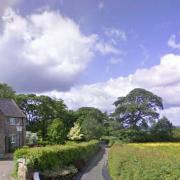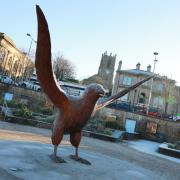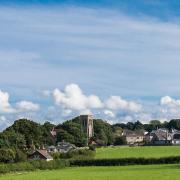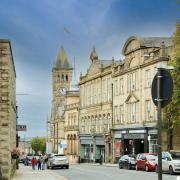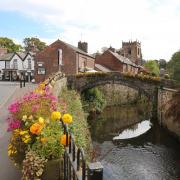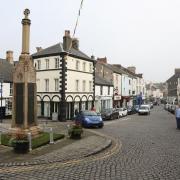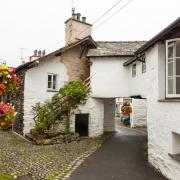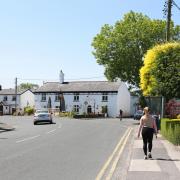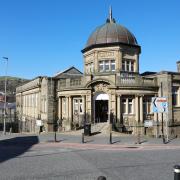A twisted cube covered in slate is one of the driving forces behind the growth of Kendal College, reports Mike Glover
Thinking outside the box is a metaphor that means to think differently, unconventionally, or from a new perspective. The phrase beloved of 1980s management-speak fits perfectly when attached to an iconic new building that is helping to breathe new life into a neglected corner of Kendal.
Appropriately the building is called The Box. It sits off Wildman Street in the unfashionable North end of the Auld Grey Town, between the railway station and 13the river Kent.Most people who visit Kendal cannot help but see the 4,000-student college’s main building on Milnthorpe Road on the A6 approach, built in the early 1970s.
That benefitted from a £12m redevelopment in 2008, giving up-to-date facilities to the hospitality and catering, hairdressing and therapy, crafts and construction, engineering and IT, business and accountancy, sports and outdoor activities, health and social and child care students who throng this award-winning college.
That development came just in time, before the last Government’s building colleges for the future initiative ran out of money, and the Learning and Skills Councils that funded it were abolished.
But Kendal College has a less obvious and much older centre, known as the Allen building, on Station Road. The place where Kendal College started celebrated 100 years in 2012.
This was quite an achievement, but it meant that 430 arts and media students, including performers and theatre technicians, remained based in the neo-classical early 20th century building.
Not to be thwarted by cash shortages, the College had to be more imaginative about bringing this part of its empire up-to-date.
Hardly had the paint dried on the Milnthorpe Road site, when phase one was implemented. A ten-year deal was done with South Lakeland District Council to take over the running of Kendal Museum, directly behind the Allen building. This has seen a new diploma in curatorship, extended opening hours, the use of the museum for exhibitions and presentations and the involvement of school groups in learning activities.
TV botanist Dr David Bellamy helped launch the revived museum, harking back to the days it inspired him while a World War II evacuee. He lauded the partnership approach as a way of preserving its unique collections of Lake District geology and stuffed animals.
Stage two was to acquire a brown-field site next door, demolish some derelict buildings and provide a state-of-the-art performance space.This time the money was tight, although £1 million was winkled out of the North West Development Agency, before it too was a victim of public spending cuts.
The result was The Box, a twisted cube slate construction, ideally suited to live performances, lectures, comedy, presentations, product launches and recordings and cinema screenings.
Its novel shape is not just for show. The unparallel walls mean its acoustics are naturally rich, lacking that dreaded school gym THOMPSONecho effect. The slate came from Broughton Quarry in the Furness Peninsula.
Facilities include a tensioned cinema screen with high definition projections, surround sound systems, advanced theatrical lighting and raked seating for up to 140 people, all with full air conditioning.
Not only do event organisers benefit from these features, but they provide essential practical training for the technical students, while would-be performers can practice their arts in a perfect environment.
‘The Box provides a dedicated performance space primarily for the performing arts and technical theatre students, but also provides a community resource,’ said college marketing manager, Paul Goodwin.
Kendal College arts and media campus has long punched above its weight in performance and production arts, drawing students from Penrith to Barrow and north Lancashire as well as South Lakeland.
It provides extended diplomas – equivalent to three A-levels – in music; art, design and media; film production; performing arts; and production arts.
Its technical students have gone on to provide expertise for festivals and events throughout the region and beyond. Head of School, Matt Burke, savours the memory of watching two ex-students, Tom Swannick and Geoff Bond, install the new sound system at the Olivier Theatre in London’s South Bank, while London-trained students watched in awe. The ability to swing on gantry ropes, gained from rock-climbing expeditions in the Lakes and Dales, was a bonus.
‘The box provides an opportunity for students to learn industry standard techniques for complex productions,’ said Mr Burke.
And performers benefit from the facilities too. Typical is Charles Brockbank, who ultimately wants to be a circus performer, and is who is studying acting, dance and voice skills.
‘Coming here was the best decision I have ever taken,’ said the 19-year-old from Appleby. He plans to use his qualification to take a degree in circus skills. Other students move on to RADA or other top London arts colleges and Liverpool Institute of Performing Arts, set up by Paul McCartney.
‘The Box is a fantastic custom-made space for drama, theatrical work and dance,’ said Mr Burke. The last piece of the Allen campus jig-saw, for the time-being at least, was the acquisition of the Castle Dairy, a Grade I-listed restaurant, in Wildman Street, which had remained empty since 2005. Again the college went into partnership with the local council to acquire the building, part of which dates back to 1304. It now showcases the College’s catering students under the careful eye of chef, Robert Stacey.
‘This has been a considerable investment which has brought regeneration to the North side of Kendal, as well as providing cutting-edge facilities for Kendal College students,’ said Mr Goodwin.
Not that the College intends to rest on its laurels: an outstanding Ofsted report; Beacon status for excellence and innovation; Training Quality Standards and even recognition from the Action for Market Towns initiative.
When the last had its annual conference in Kendal, because it was a town ‘getting it right’, the college came in for particular praise.
It is in the forefront of providing the quota of apprenticeships demanded by the Government, with 766 going through its books in the last year.
Now it is hoping to receive planning permission for an exciting new engineering and pharmaceutical block to provide much needed apprentices for those expanding industries.
Thinking outside the box is obviously par for the course at Kendal College.




